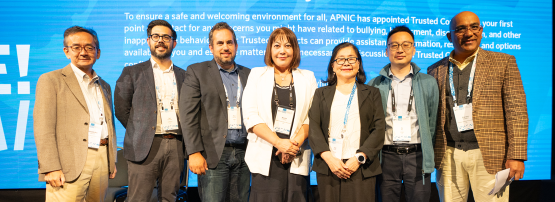
The Cooperation Special Interest Group (SIG) session at APNIC 58 in Wellington, New Zealand, focused on the historical significance and future revisions of the Internet Coordination Policy 2 (ICP-2).
Initially developed over 25 years ago, ICP-2 set the criteria for recognizing new Regional Internet Registries (RIRs), such as LACNIC and AFRINIC. The policy has served the global Internet community well over the past two decades, but with the evolving Internet landscape, a revision is necessary due to the growing community interest, complexity, and global importance of the Internet, and its resultant challenges such as failures in good governance, technical capability, and evolving security threats.
Community participation was emphasized as a major part of the session, with the panellists, which included Internet pioneers, highlighting the need for broad community input, including contributions from the legendary to the next generation of Internet stakeholders. This will ensure that the document remains inclusive and adaptable to new technologies and the changing digital landscape. Governance and policy challenges, particularly around security, privacy, and technical capability, were highlighted as essential challenges to be addressed in the revised ICP-2. The ultimate goal is to strengthen the RIR ecosystem and ensure its sustainability for the future.
The session highlighted the importance of revising ICP-2 to better reflect the current Internet environment. The policy needs to address not just the criteria for recognizing new RIRs but also how to maintain the operational integrity, good governance and technical capability of existing ones.
The following key themes emerged during the session:
- Security and privacy: The evolving nature of cyber threats means that RIRs must prioritize security and privacy. These are no longer just technical challenges; they are governance issues that need to be front and centre in any revised version of ICP-2.
- Community engagement: A robust, inclusive process for revising ICP-2 is essential. The session underscored the need for broader community involvement, from governments, private sector, civil society and industry multistakeholders to the next generation of Internet professionals.
- Balancing generations and regions: Another critical point of discussion was how to incorporate the perspectives of both experienced professionals and younger generations. In regions like South East Asia and Africa, where infrastructure varies widely, any revised policy must address the unique needs of developing nations.
The upcoming revision of ICP-2 offers a unique opportunity for the global Internet community to help shape the future of Internet governance. This is not just a technical process, it’s about ensuring that the Internet remains open, reliable, inclusive, and secure for the next 25 years and beyond.
As discussions continue, one thing is clear — the future of Internet governance depends on collaboration. Whether you are a seasoned Internet governance expert or a young professional just starting in the field, your voice matters in this important process. The Internet, as one panellist noted, “is not just about technology — it’s about people.” And the policies that govern it must reflect that reality.
Stay tuned for more developments as the Internet community continues its work to strengthen and revise ICP-2, ensuring that the global Internet remains resilient, inclusive, and accessible for all.
Watch the full Cooperation SIG session from APNIC 58 below, or find a shortened version that focuses solely on information related to ICP-2 in the post “The NRO invites Internet community to participate in ICP-2 questionnaire”.
Bikram is the Head of Digital Banking of the Sanima Bank Ltd, the President of Nepal Internet Foundation in Nepal, and the APNIC Cooperation SIG Co-Chair.
The views expressed by the authors of this blog are their own and do not necessarily reflect the views of APNIC. Please note a Code of Conduct applies to this blog.
